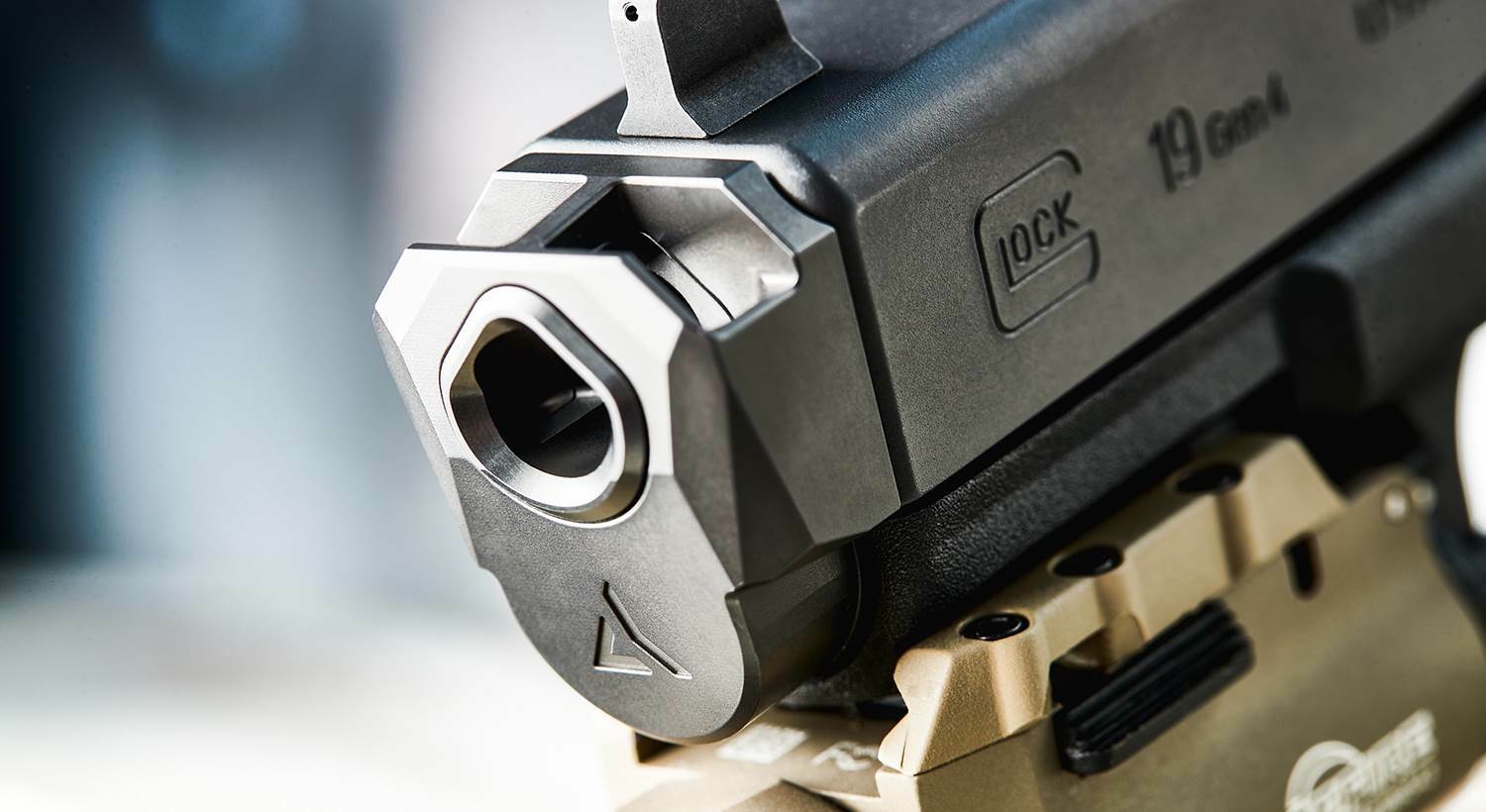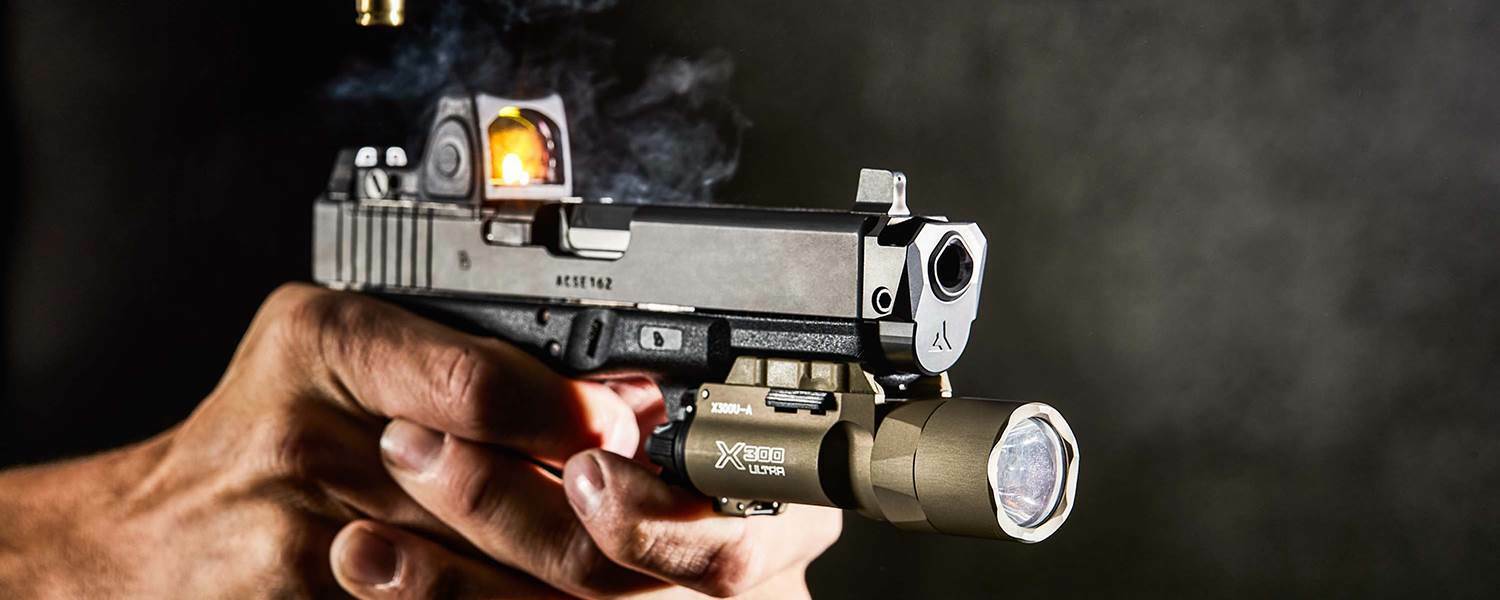
Whether you’re new to shooting, planning to customize your first pistol, or leaning into a new interest in handgun marksmanship, you might be wondering — what does a compensator do on a pistol?
The purpose of a pistol compensator is threefold: it can contribute to accuracy, speed, and comfort for shooters. In this guide, we’re digging deep into this misunderstood marksmanship tool, answering a few key questions:
- What is a pistol compensator?
- What does a compensator do on a pistol?
- Why should you add a compensator to your handgun?
- Which is a better choice for you: a muzzle brake or a compensator?
This guide for newcomers and pros alike will help you understand the intricacies of the compensator and refine your custom build.
What Does a Compensator Do on a Pistol?
What is a pistol compensator, exactly? To understand, you’ll need a picture of what happens when you discharge a pistol round:
- Powder ignites in the casing, creating a combustion reaction.
- Combustion pushes the round out of the barrel and downrange.
- Combustion also creates gasses and light.
The gasses created after powder ignition propel the round downrange, but some gasses are wasted in the process; these contribute to the sounds, visuals, and movements you’ll experience during shooting.
The purpose of a pistol compensator is to redirect the gasses expelled from the end of the barrel during firing. Instead of letting the gasses move as they please, a compensator directs gasses to specific areas around the barrel, compensating for the gasses that can make the muzzle rise after firing a round.
Why Should You Add a Compensator to Your Custom Handgun?
Why would a shooter want to regain some control over the gasses expelled while shooting? Let’s break down three key purposes of a pistol compensator in practice.
It Can Support Accuracy
Gasses expelled during shooting can cause muzzle rise — a natural uplift as a result of gasses discharged forward. Muzzle rise (and, sometimes more importantly, the shooters’ anticipation of muzzle rise) can cause both:
- First-shot target loss – No matter how much time shooters take to get stable on a target, muzzle rise can cause shooters to miss the target.
- Follow-up shot misses – In rapid follow-up firing (in a home defense scenario, for instance), muzzle rise can impact accuracy.
Thus, a compensator can help shooters both experience less rise on the first shot (and reduce their anticipation) and support accuracy on follow-up shots.
It Can Speed Up Follow-Up Shot Times
Shooters experienced in pistol marksmanship without muzzle devices are likely intimately familiar with muzzle rise; in practice, it can mean longer pauses between shots so that shooters can regain their target confidently.
Since a compensator helps the muzzle stay more stable during repeat fire, shooters may take less time to find their target in rapid-firing scenarios.
It Can Improve Shooting Comfort for New Shooters

Muzzle devices in general harness and redirect combustion gasses to achieve a variety of results, including:
- Compensating for muzzle rise
- Reducing felt recoil
- Redirecting flashes and sounds downrange (and away from the shooter)
Depending on the specific design of your compensator, you can achieve some combination of all these results. These are particularly useful for new shooters who:
- Aren’t yet comfortable with firearm movement during discharge
- Struggle to maintain muzzle control during firing
- Are startled by sounds, recoil, and flash
Compensators vs. Muzzle Brakes: Which Should You Choose?
A typical competitor of the compensator is the muzzle brake — a tool used on a wide variety of firearms to redirect gasses.
While compensators are primarily designed to reduce muzzle rise, a muzzle brake’s intended purpose is to reduce felt recoil by redirecting gasses to the side. Instead of compensating for rise, muzzle brakes generally improve comfort.
Depending on your shooting goals, experience level, and applications, either of these muzzle devices might work for your pistol. Experts recommend trying each device and practicing with them to decide which one is right for you.
Wing Tactical: Your Source for Compensators and Other Pistol Accessories
The purpose of a pistol compensator is multifaceted: it can improve accuracy, support speedier follow-up shots, and increase comfort for all types of shooters. No matter why you’re considering adding a compensator (or another muzzle device) to your custom firearm, Wing Tactical can help you choose the right product for your specific weapon, applications, and experience level.
Check out our collection of muzzle devices and barrels for inspiration, or chat with our customer service team for expert advice on firearm customization and accessories.